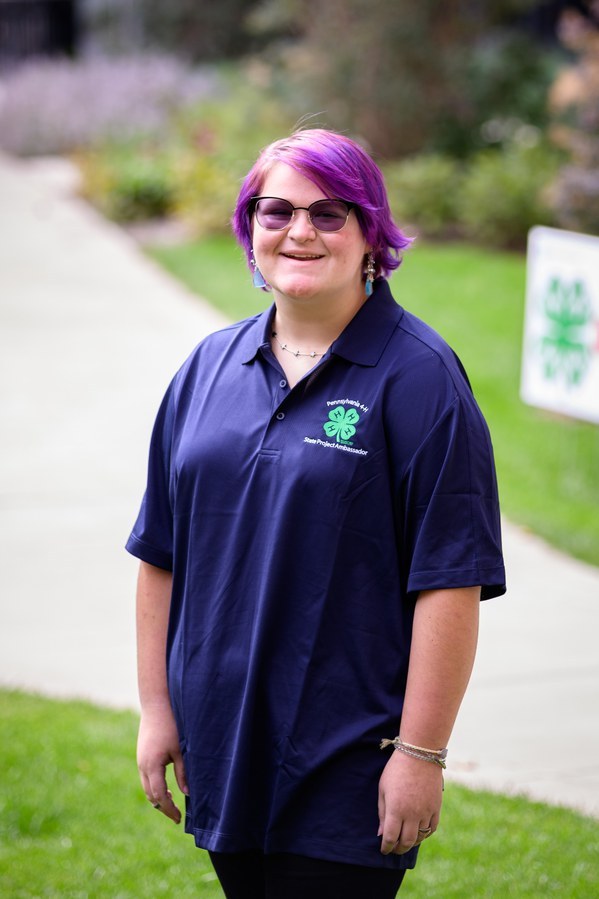Posted: October 9, 2023
The U.S. Environmental Protection Agency recently announced the formal establishment of the agency's first-ever National Environmental Youth Advisory Council — an initiative sparked by a recommendation from Pennsylvania 4-H member Grace Ziegmont, of York County, during the National 4-H Conference in April.

Grace Ziegmont
Aimed at bringing youth voice to high-level government discussions, the conference invited 4-H members ages 15-19 to participate in roundtable discussions on pressing national topics and present their ideas to a federal agency.
Ziegmont and her team suggested that the EPA start a youth advisory council. They presented their idea to the Council on Environmental Quality within the Executive Office of the President, which consisted of members from the council, the EPA, and the U.S. Department of Agriculture.
"I was nervous going into it because these people have decades of experience working with environmental justice — why would they listen to a bunch of teenagers?" Ziegmont said. "Everyone there was extremely welcoming and interested in what we had to say. It went way better than I ever could have imagined."
When pitching the idea, the team compared it to the Pennsylvania 4-H State Council and State Project Ambassador format, emphasizing the focus on youth feedback.
"They give opportunities to highly motivated youth to provide feedback on programs that directly affect them and other youth," Ziegmont said.
The Pennsylvania 4-H State Council acts as official program representatives, engaging in various activities and events throughout the state. State Project Ambassadors provide a youth perspective to statewide program areas, collaborating with 4-H educators on planning events, curricula, and initiatives. Ziegmont is an environmental science, shooting sports, and camping ambassador.
"Most of us working on the project had experience with state-level 4-H leadership teams, which allowed us to take the parts we liked from leadership opportunities from across the country to create what we thought would be most effective," Ziegmont said.
The youth council will provide independent advice and recommendations to Administrator Michael S. Regan on how to increase EPA's efforts to address a range of environmental issues as they relate to youth communities. The council will provide a critical perspective on how the impacts of climate change and other environmental harms affect youth communities. Ziegmont said she is excited for the council and sees a lot of potential.
"Our hope in proposing the youth council was not only to engage and educate its members but also to give them the tools and resources to help support youth in their communities through environmental education," Ziegmont said.
With 13% of the U.S. population under the age of 18, this group is the most underrepresented in the federal government, she pointed out. "Long-lasting decisions are being made, but before this council existed, there were no ways for those who will be impacted to provide feedback," she said.
Ziegmont's team focused on ensuring that the council includes members from underprivileged communities with diverse backgrounds to amplify the voices of communities she said the federal government often overlooks.
The EPA will select 16 members aged 16 to 29 to serve on the council. At least 50% of the council's members will represent disadvantaged communities as defined by the Climate and Economic Justice Screening Tool.
"I'm extremely passionate about environmental education, especially diversity and inclusion in environmental education," Ziegmont said. "Oftentimes, urban communities don't have access to the resources to learn about environmental science that rural communities do. What might be right outside someone's back door in rural communities might be 30-40 minutes away and not easily accessible for someone who lives in central Philadelphia."
Without access to proper resources, youth in urban areas, in particular, miss out on opportunities to learn about environmental science, making them less likely to care about environmental issues, she said.
As a 4-H state project ambassador, Ziegmont said she enjoys connecting with younger 4-H'ers in environmental science and watching them develop a passion for the environment.
To other teenagers interested in making a positive impact on environmental issues, she suggested they "go after every opportunity that presents itself. It never hurts to apply for something you're interested in — the worst that could happen is you don't get selected. It's better to try than to wonder what would happen if you didn't go for it."
Administered in Pennsylvania by Penn State Extension, 4-H is a nonformal educational youth-development program of the U.S. Department of Agriculture that helps young people develop knowledge and skills to become capable, caring, and contributing citizens. To find your local program, visit the Pennsylvania 4-H website.

